A Thai Sacred-Tattoo Burger? Why This Counts as Buddhism
A new Bangkok tourist attraction blends the spiritual and the culinary. The post A Thai Sacred-Tattoo Burger? Why This Counts as Buddhism appeared first on Tricycle: The Buddhist Review.

This year, the Chinese midautumn festival, also known as the mooncake festival, falls on October 6. Following the lunisolar calendar, the festival commemorates the harvest season, family reunions, viewing the moon, and consuming mooncakes.
For those looking for a truly unique type of mooncake, consider Bangkok, Thailand, for your next trip. The Land of Smiles was named the 2025 destination of the year by Travel + Leisure magazine, and its capital city, Bangkok (along with Koh Samui and Phuket), was the filming location for Season 3 of the HBO series The White Lotus.
Bangkok is home for many Chinese diaspora and Sino-Thais, who, at one point, represented as much as 50 percent of the metropolitan’s population in the 1950s. Now under the spotlight (or, perhaps, moonlight) is one up-and-coming Sino-Thai business owner and his company, Nakorn Mu, which specializes in sacralized Buddhist-themed culinary innovations. Sacred-tattoo mooncakes are one of their most popular offerings. But the signature dish that started it all is their sacred-tattoo burger. Yet before the success of their Buddhist-faith-based epicurean lineup and sustainable business model, Nakorn Mu began with humble beginnings.
Thus Have I Heard
At one time, Mr. Baas (pronounced “Bawt”), the founder of Nakorn Mu, had struggled to maintain a successful business enterprise. Before Nakorn Mu, Baas had tried thirteen different ventures, yet all were in vain. Not giving up, Baas began in earnest to conceptualize a new business idea, this time, one involving food. When Covid-19 caused Bangkok to go into lockdown, the pandemic awakened Baas’s humanitarian instincts. “I wanted to offer something that would cheer people up,” he explained. “It shouldn’t be just about business.” For him, the service must also offer “emotional value, to give people a sense of hope.”
Moreover, Baas endeavored to create a brand that would spotlight Thai culture. But to offset an unknown variable for those unfamiliar with Thailand, Baas discerned that the brand’s main showcased food should be a globally recognized item. Pizza was the first idea, but something felt off. Then came the idea to open a burger venture, and violà! Baas found a winning combination between an international food item and Thai culture—burgers, infused with quintessential Thai culinary profiles, topped with sacralized buns and gossamer gold-leaf paper as garnish. It all clicked at the drawing board when Baas asked himself, “What can we get from a collab between Thai food and Thai faith?”
Thus the Buddhist sacred-tattoo burger was born. Baas began his venture opening his first food truck in January 2023, situated in a famous outdoor night market, Bangkok’s Jodd Fairs Rama 9. At Nakorn Mu, customers can choose from three different Thai flavors and protein patties—tom yum shrimp, khao soi chicken, or khua kling beef. And, for the main attraction, the bun is stamped with one of three sak-yant (sacred magical tattoo) designs, each tailored for a specific type of wish—with stamps designating wishes related to wealth, power, and love.
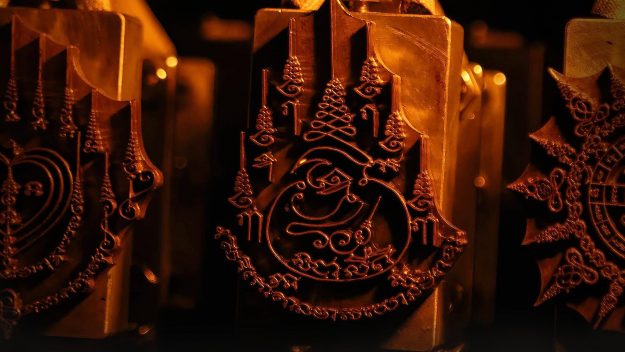 The Nakorn Mu Sak Yant Tattoo stamps. | Image via Facebook.
The Nakorn Mu Sak Yant Tattoo stamps. | Image via Facebook.Readers may be familiar with popular sak-yant tattoos adorned on Hollywood celebrities like Angelina Jolie or British singer-songwriter Ed Sheeran. These tattoos are sacred because they consist of magical diagrams, or yant (the Thai pronunciation for the Sanskrit word, yantra). Hence, the tattoo form of yantra are sak-yant, since the traditional Thai method involves “tapping” (sak) the image onto the skin. However, the transition from marking human flesh to edible burger buns requires a different method for image transfer. Instead, for the burger bun, the yantra image is imprinted with a stamp. Baas commissioned a Buddhist monk to design and bless three unique yantra images for his custom-made culinary-grade stamps. The stamped buns quickly went viral, with foodies dubbing it “the world’s first sacred tattoo-burger.”
From Food Truck to Fine Dining and Sustainability
Demand led to the opening of Nakorn Mu’s second truck in April 2023, at DanNeramit market, and a three-month summer contract at the luxury mall Central World. In February 2024, the lease for the food-stall rental expired. Instead of renewing, however, Baas took time off to respond to consumer insights and reconceptualize his business model. Baas reflected that he wanted customers to “have an experience beyond just a burger.” Moreover, upon feedback from foreigners, he is also currently experimenting to create a comparable veggie burger option.
Thus began a series of moves aimed at simplifying Baas’s offerings. What was originally conceived of as Nakorn Mu Burger is now rebranded simply as Nakorn Mu. Beyond the name, Baas also sought to simplify the business model. This meant no more outdoor night markets. No more food trucks. Not even a permanent store front. The service transformed into a sustainable fine-dining experience. The new name, meaning “Mu City,” without a specific noun (burger or fine dining), is strategic. It allows the business to effortlessly expand its future service offerings.
Nakorn Mu is also sustainable. First, there is no permanent restaurant. Rather than deplete resources to construct a new building, it partners with existing shop spaces (think “co-resto” space, instead of co-workspace). This business model requires reservations only, no walk-ins. The first co-setup is with Hypnotized Bar in Talat Noi, off Chinatown. One can order a sacred burger and, just around the corner, pay respects to the Optimus Prime statue, another of Bangkok’s latest pop-culture-inspired spiritual trends.
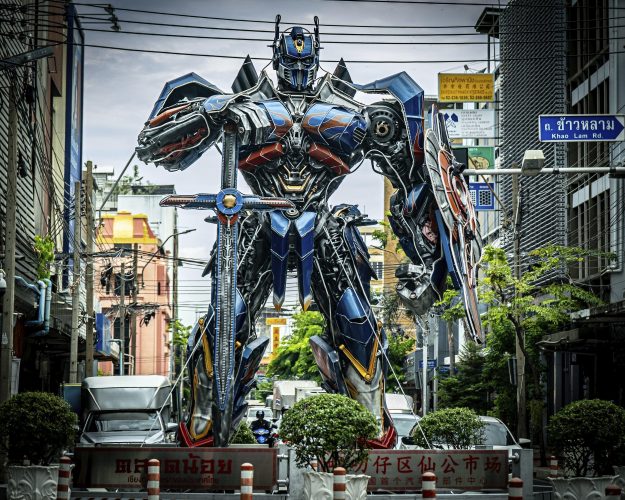 The giant Optimus Prime robot statue in Khao Lam Road in Bangkok, Thailand. | Image via imageBROKER.com / Alamy
The giant Optimus Prime robot statue in Khao Lam Road in Bangkok, Thailand. | Image via imageBROKER.com / AlamyJust as Optimus Prime is constructed from recycled parts, Nakorn Mu’s business makes use of food items, wholly (and holy). Nothing is wasted. Baas calls this concept “Non-Wastaurant”—a portmanteau of “nonwaste” and “restaurant.” Ultimately, this fine-dining upgrade of Nakorn Mu is only in a trial period. Baas doesn’t have any expectations. “I just want to see how it goes,” he says humbly.
Buddhism Is Also Material
This story might sound like fiction, but it is not. And it might not appear as “authentic” Buddhism, but it is. Why have we ignored Buddhist material practices? As Professor of Buddhist Studies at Elon University Pamela Winfield explains, Americans’ conception of Buddhism as “just a philosophy” is influenced by a long history that began with its 19th-century introduction to Eastern religions and the vogue of Oriental mysticism.
Indeed, Western notions of Buddhism have stripped it of its supernatural, ritual, and material culture, unless, of course, it’s associated with philosophically aligned canonical texts, monks, or mindfulness. Such preoccupation with the latter is what I have observed as the “Three-M-s.”
Thai Buddhism is unapologetically intertwined with supernatural and material culture.
As any tourist to the Land of Smiles can observe, the Buddhism practiced in Thailand is much more than manuscripts, monasticism, and meditation. Thai Buddhism is unapologetically intertwined with supernatural and material culture. It is a study I have been researching over the past fifteen years, culminating in a working book project that acknowledges what I call “material Buddhists.”
As half-Thai and a scholar of contemporary Thai Buddhism, I explore everything including temples, spirits, and modern expressions of faith, now categorized under the phenomenon known in Thai as “mutelu” (indeed, the latter is the namesake behind the syllable “mu” of Nakorn Mu).
Mutelu may be akin to the “Spiritual But Not Religious” (SBNR) trends in the United States. While no English translation would quite do it justice, Thai media recognize mutelu as an umbrella category describing spiritual practices (such as yantra, amulets, other sacred objects, rituals, chants, invoking the supernatural) with modern flair (what I observe as an “aesthetic of delight”) to fulfill personal aspirations. Such faith-based commerce and practices are on the rise among Thai Gen Z. Baas explained that partaking in mutelu provides tangible hope in dark times.
While one cannot generalize about every Thai Buddhist, such supernatural and materialistic practices exist, persist, and show no signs of slowing down. In fact, the practices often adapt. And that’s why the Thai religious landscape is a surprisingly conducive environment for unique creations like that of the sacred burger.
“Glocal Gastronomy” as Future “Sutra”?
Baas’s conceptualization of the sacred burger began with his desire to introduce the world to Thai food and Thai faith. During our interview, he explained that Nakorn Mu is “inspired by [Thai] beliefs, sacred objects, and sacred local ingredients.” And all that is aesthetically curated to result in not just a meal but also an experience, what he calls “special food art.”
Baas has appeared for interviews in more than 120 media programs. Notably, he was featured in the Thai travel guidebook of Roger Wu, a Hong Kong celebrity with 2.2 million TikTok followers and 188,000 YouTube subscribers. And in 2024, Baas won Thailand’s Hall of Food Award.
This article opened with the famous Pali phrase that begins many a Buddhist sutra: evam me sutam, or “Thus have I heard.” Through the Pali canon, the phrase is used to serve to authenticate the Buddha’s teachings. While Americans identify Buddhism as a philosophy—via sutras, meditation, or the trope of the Oriental monk—I hope readers will expand their horizons on what counts as “authentic” Buddhism and explore the multiplicity of practices of all Buddhisms.
Who knows? In the years to come, perhaps Buddha’s teachings will not be confined to a recollection of what was heard, written, or hours of sitting. Perhaps it will also be substantiated with something that satiates one’s appetite. In this case, perhaps Buddhist practice might one day begin with the phrase “Thus have I tasted.”

 KickT
KickT 







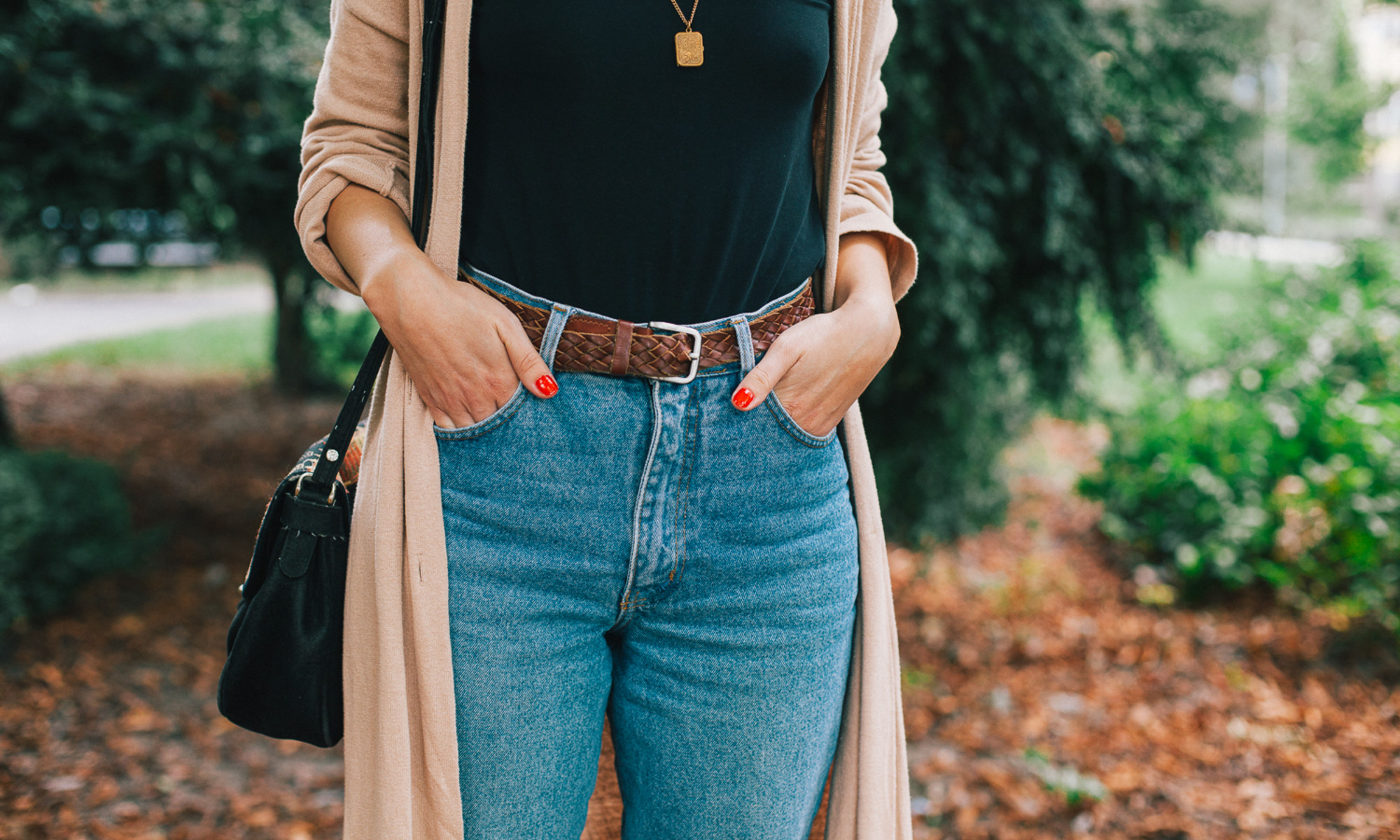
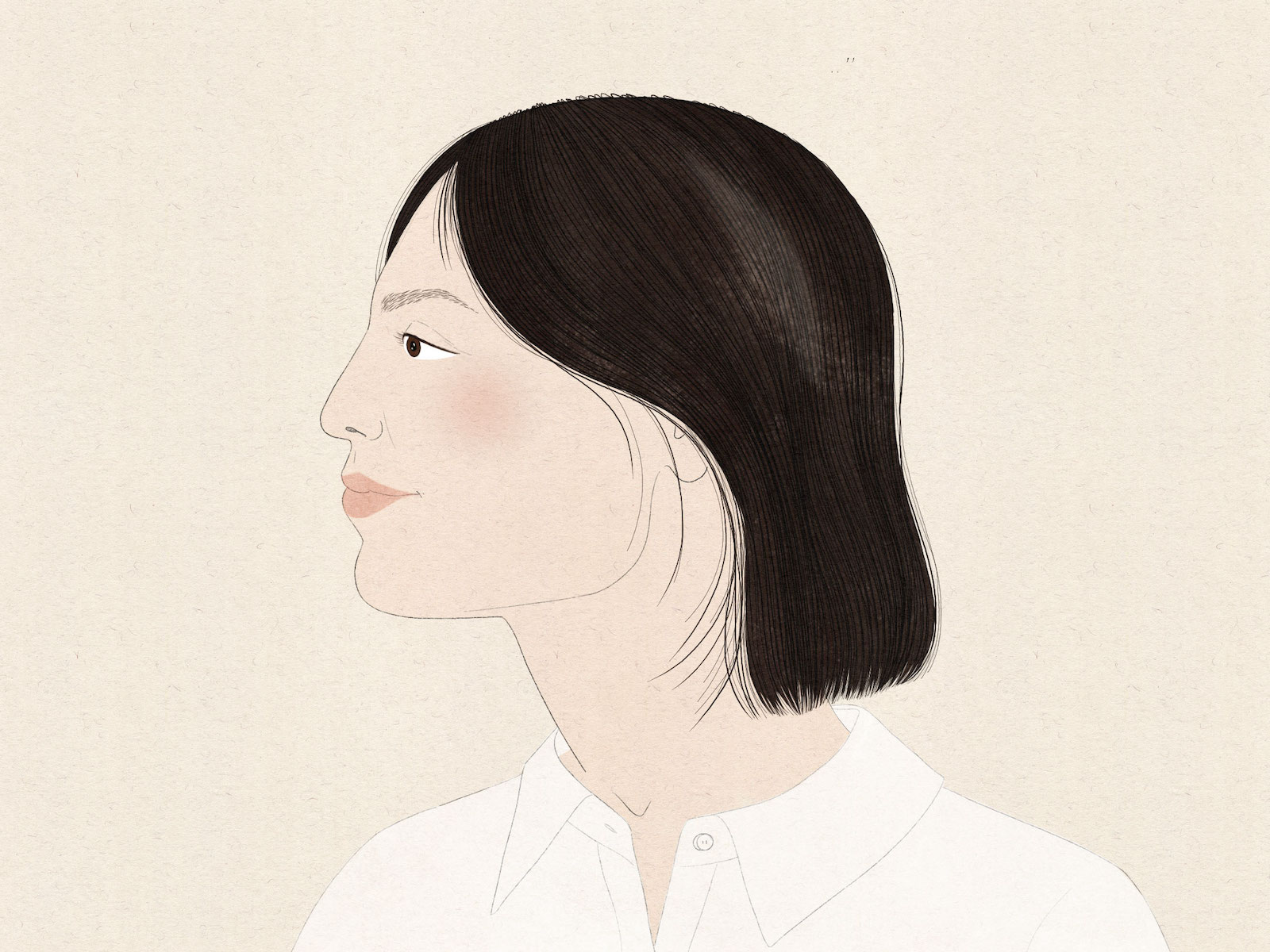
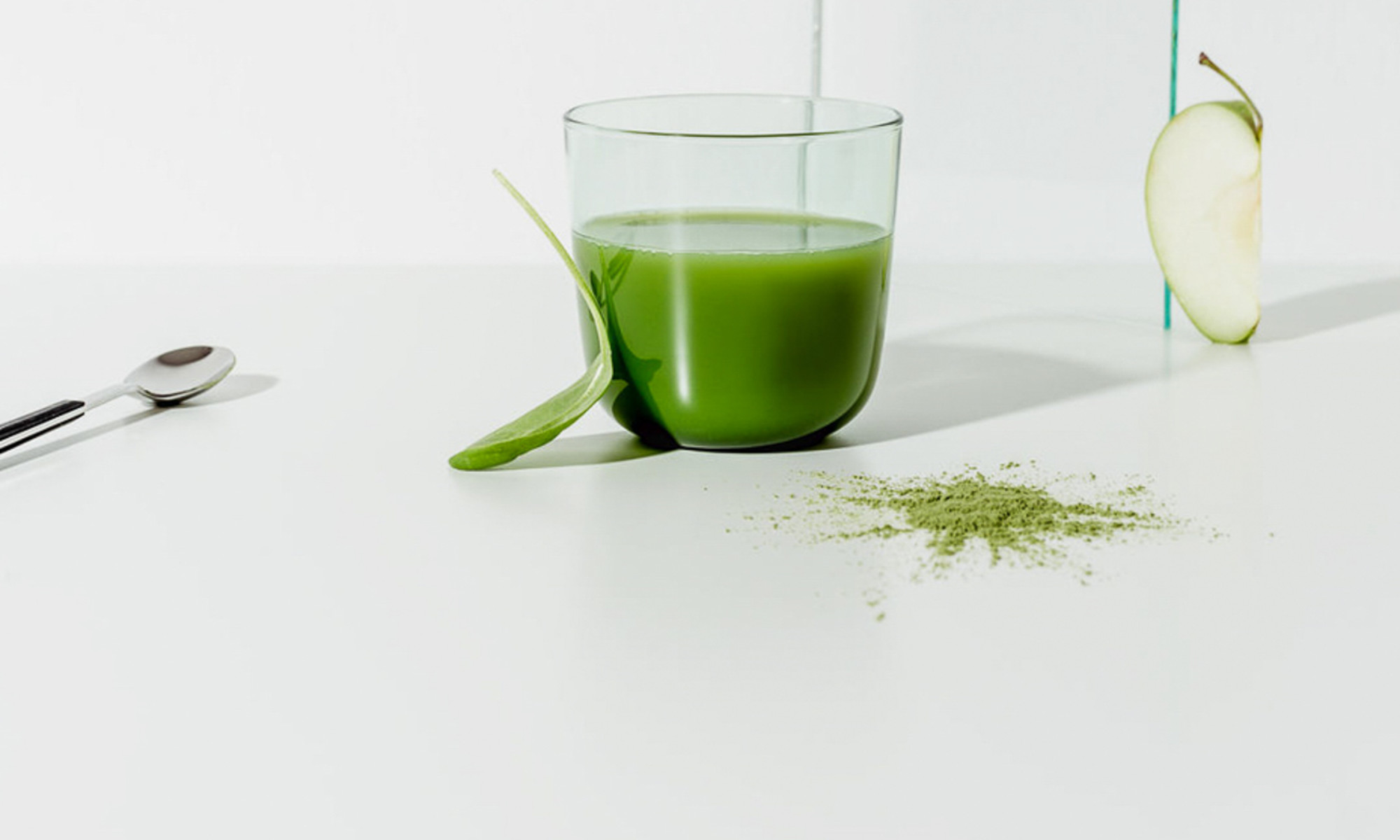


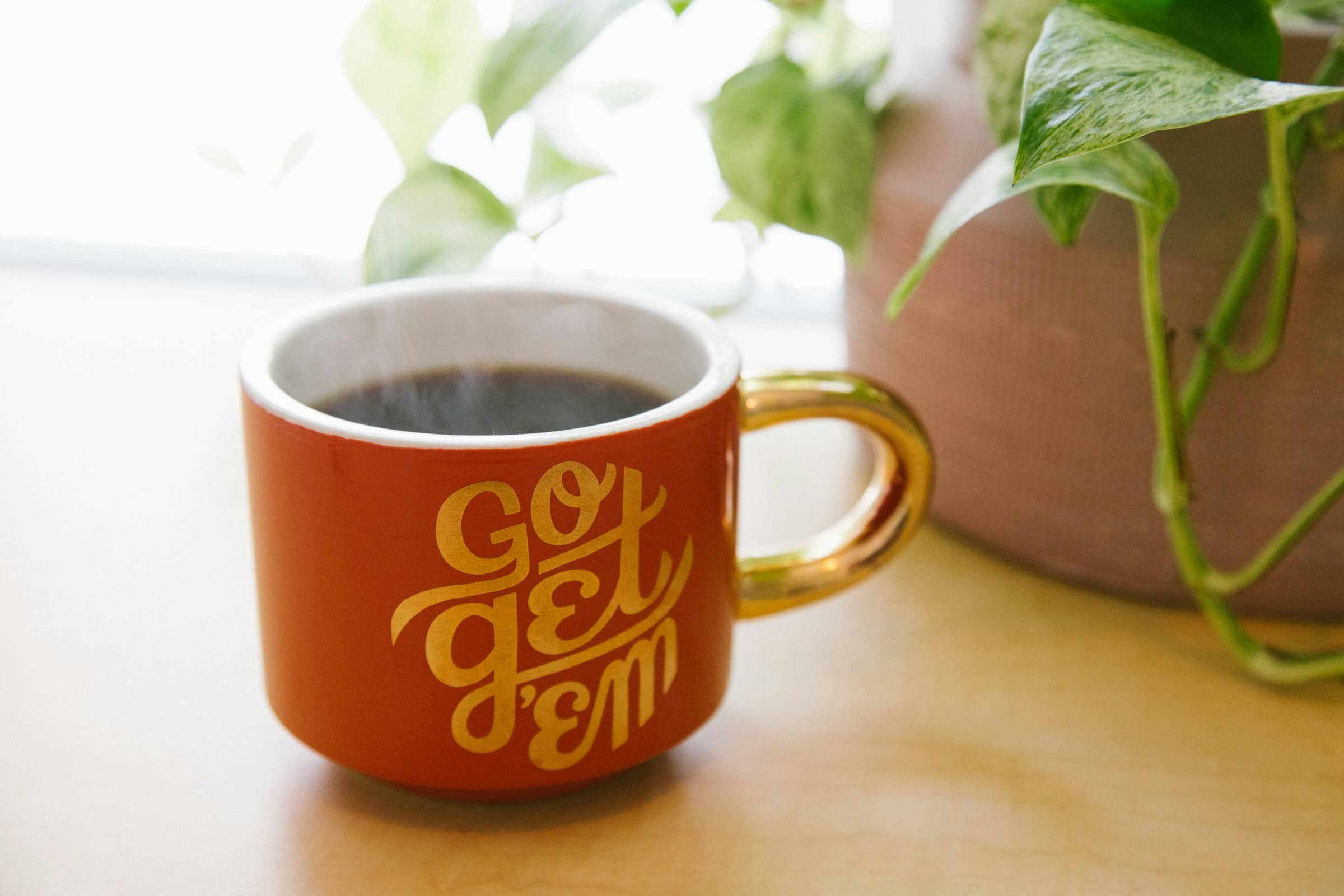















.jpg&h=630&w=1200&q=100&v=90ed771b68&c=1)


